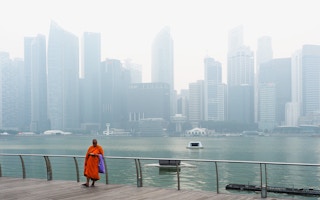Trend stories that took the pulse of the moment, looking at what’s fresh and talked about in the sustainability sector, had Eco-Business readers abuzz in the year 2023. Feature stories and podcasts that focused on amplifying the voices of vulnerable communities, with their stories often untold or under-reported, also created an impact. Here are the 10 most read stories this year:
To continue reading, subscribe to Eco‑Business.
There's something for everyone. We offer a range of subscription plans.
- Access our stories and receive our Insights Weekly newsletter with the free EB Member plan.
- Unlock unlimited access to our content and archive with EB Circle.
- Publish your content with EB Premium.
1. Will ChatGPT write our future ESG reports?

A smartphone displaying an open chat with OpenAI’s popular chatbot ChatGPT, with the ChatGPT log in screen also displayed in the background. Image: Ascannio/Shutterstock
The arrival of ChatGPT launched a million think-pieces – from speculation that this new dawn of artificial intelligence (AI) would free the workforce of the most menial and tedious tasks to fear-mongering claims that the algorithm is out to get everyone’s jobs and shake up entire industries.
When it comes to ESG reporting, however, sustainability experts have rejected the notion that the chatbots can now replace professionals when it comes to analytical thought and nuanced judgment. Instead, they see tools like ChatGPT more as a handy ‘consultant’ that can sort through data.
With everyone from Elon Musk to Pope Francis calling on governments to lay down bylaws to regulate AI, it remains to be seen how the technology will develop and whether if it will continue to create buzz and make waves in the sustainability sector.
2. Singapore sustainability sector salary survey: who’s paid most?

“Sustainability salaries will continue to grow in Singapore but the level of salary increment will not be as substantial, because the talent pool is maturing,” said Gabriel Nam, partner, ESG, strategy and transformation, Michael Page International. Image: Robin Hicks/Eco-Business
The times are a-changin! Platforms like Glassdoor are empowering workers to dish on their former employers and The Great Resignation brought on by the pandemic has seen young professionals hop from one company to another to leverage their job qualifications toward a higher tax bracket.
Pay transparency has also become the norm, with a 2023 survey plotting what salary grades fresh graduates and upstarts alike can expect as they enter and navigate the sustainability sector. Unsurprisingly, the chief sustainability officers of Singapore’s largest coffers raked in the most dough – their salaries are up to sevenfold of their junior executive counterparts in the civic society space.
3. ‘Our own narratives told’: Through the lenses of young Orang Asli women filmmakers
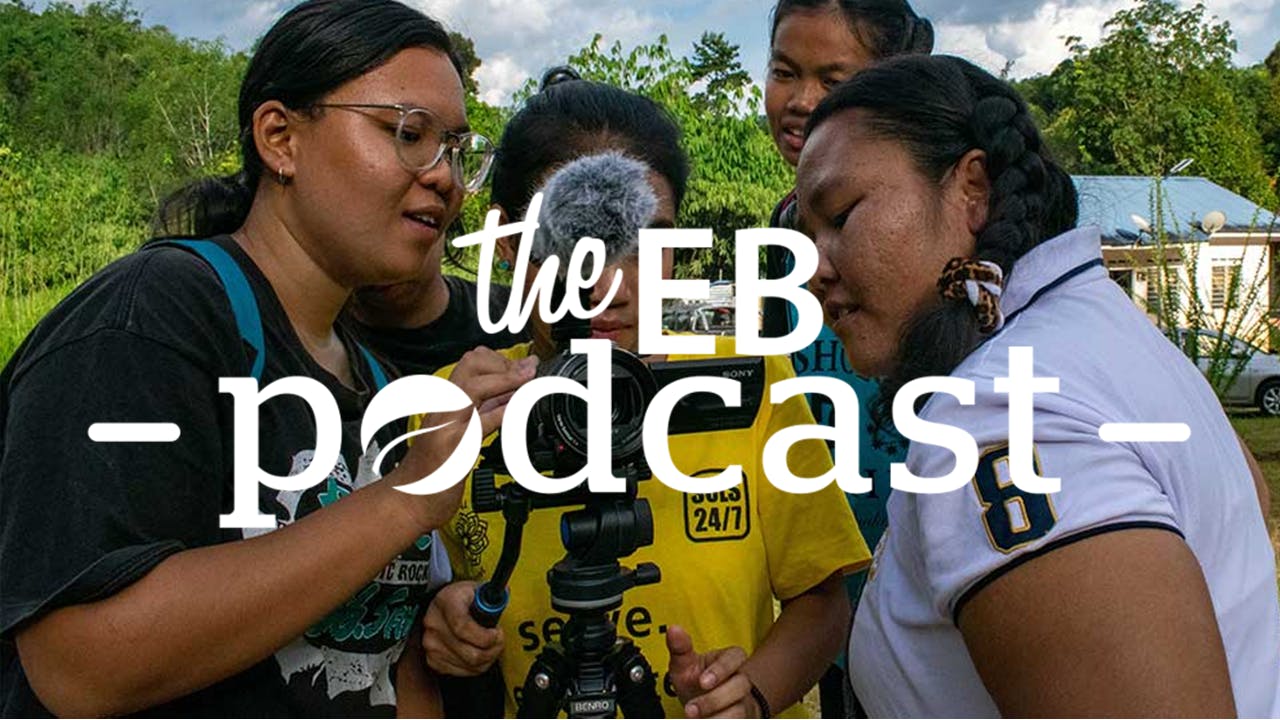
Young indigineous women in Malaysia are being trained as filmmakers in the Freedom Film Network’s Amplifying the Voices of Young Orang Asli Women programme. Yaliyanna Lenab (far right) spoke to Eco-Business about her experiences in a bilingual podcast. Image: Freedom Film Network
Indigenous peoples – especially women – are rarely afforded the platform to share their narratives and talk about the struggles they face protecting their vulnerable lands and customs passed on from one generation to another.
In this award-winning bilingual podcast, Eco-Business spoke to Orang Asli women filmmakers native to Peninsular Malaysia about their journey toward documenting the tales of their communities and their organised movement for human rights and equality.
The first of its kind recorded in both English and Bahasa Melayu, this podcast has gone on to win gold at the Asian Digital Media Awards.
4. Indonesia’s Cirebon 1 coal power project highlights gaps in ADB’s ‘coal-to-clean’ ETM scheme
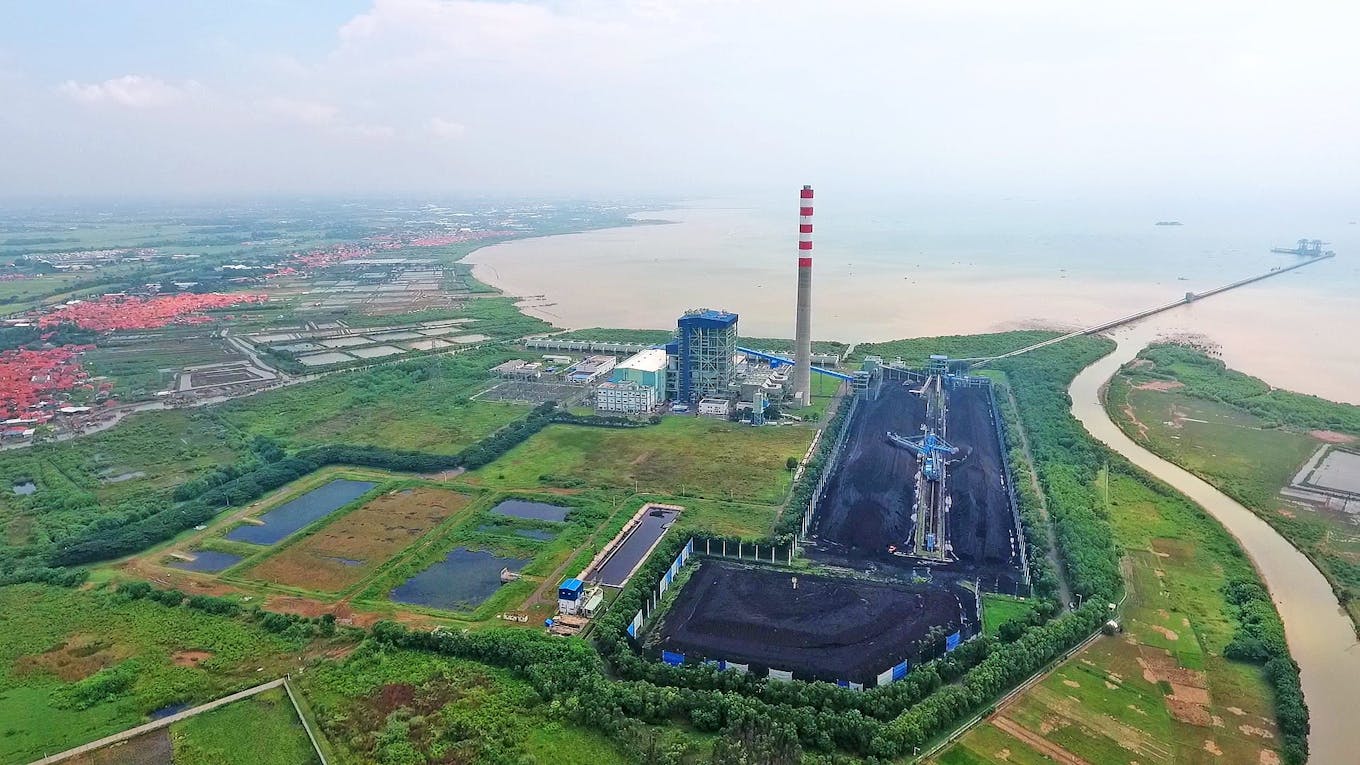
The 600-megawatt Cirebon 1 coal power plant in West Java, Indonesia. The Asian Development Bank is leading efforts to close this unit 10 to 15 years early. Progress on early coal retirement has been slow, due to the difficulty of putting together feasible financing packages. Image: ResponsiBank Indonesia.
Despite aiming to finance the decarbonisation and renewable energy uptake of target countries like Indonesia and Vietnam, Just Energy Transition Partnerships (JETP) the world over have come under scrutiny for red flags that have ranged from human rights concerns to contentious captive coal plants that see no immediate signs of being shelved or decommissioned.
In the fishing town of Kanci in Indonesia’s West Java, one of these coal projects has taken a human toll: the Cirebon 1 coal power project has allegedly wrought devastating impacts on the livelihoods and health of the communities that live along the Cipaluh and Kanci rivers adjacent to the facility, according to this report.
5. Singapore among the first in Asia to propose mandatory climate reporting for non-listed companies
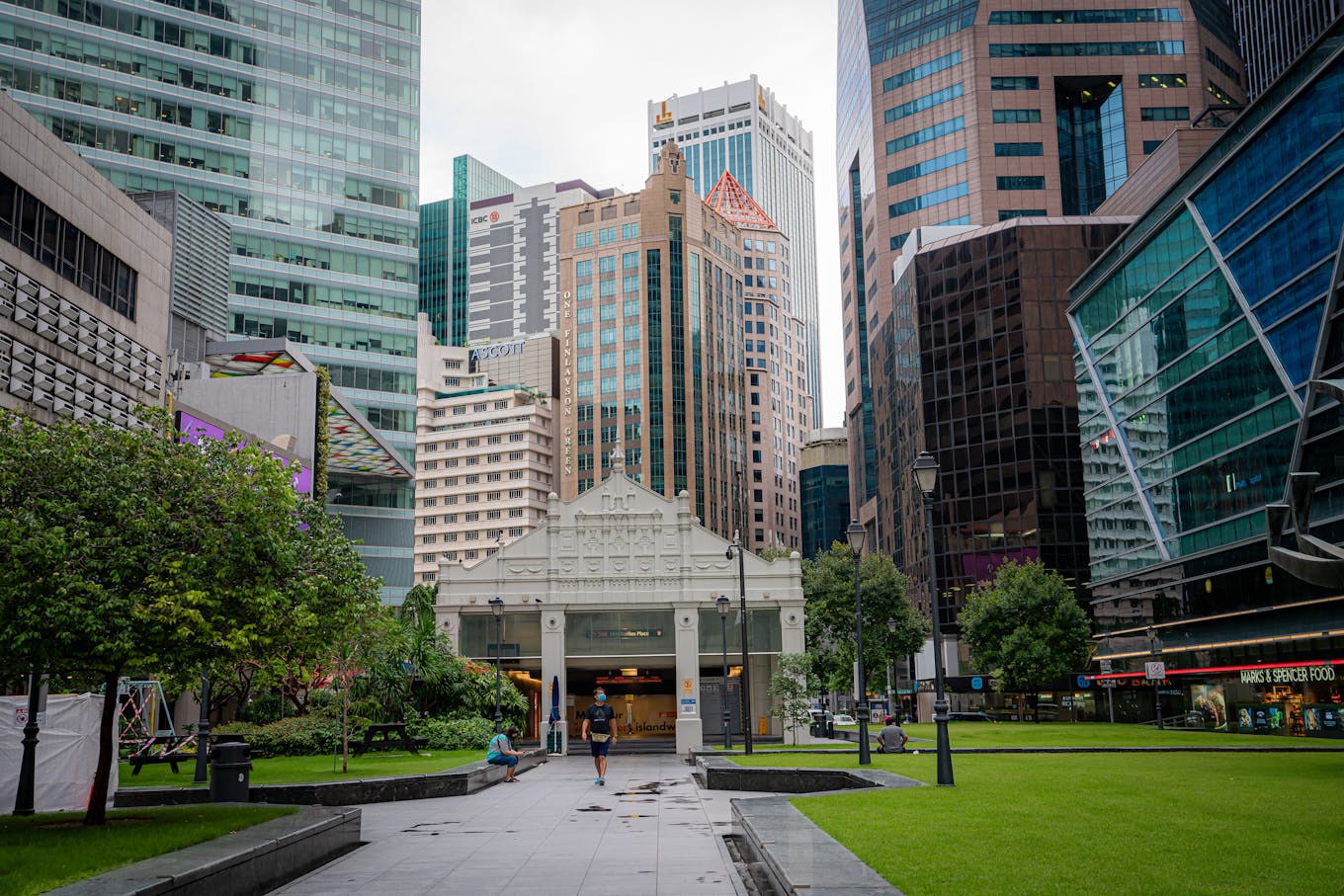
The Accounting and Corporate Regulatory Authority (ACRA) and Singapore Exchange Regulation (SGX RegCo) launched a public consultation on mandatory climate reporting for listed and large non-listed companies in July. Image: Jessica Cheam/Eco-Business
Singapore regulators are poised to enforce mandatory climate-related disclosures on listed companies as soon as the financial year 2025, with the mandate seen to extend to large non-listed companies by 2027.
If implemented, Singapore could become the first Asian jurisdiction to require International Sustainability Standards Board-aligned climate reporting for non-listed entities.
6. Philippines luxury estate inspired by Banaue Rice Terraces poses risk to environment, say urban planners

An artist’s perspective of the Monterrazas de Cebu residential development. Image: Monterrazas de Cebu Facebook page
Urban planners caution against potential environmental risks in a Cebu real estate project – “The Rise at Monterrazas,” a 200-hectare luxury condominium on a mountainside overlooking the metropolitan city in the Philippines’ Visayas region. Concerns about landslides and flooding during construction have also prompted calls for mitigation measures.
Despite zoning board approval, environmental clearance from the Department of Environment and Natural Resources, however, is still pending. The terraced design, inspired by the Philippines’ Banaue Rice Terraces, is the vanity project of Filipino content creator and civil engineer Slater Young and his 8990 Housing Development Corporation.
7. Vietnam, once regional renewables beacon, loses shine to neighbours
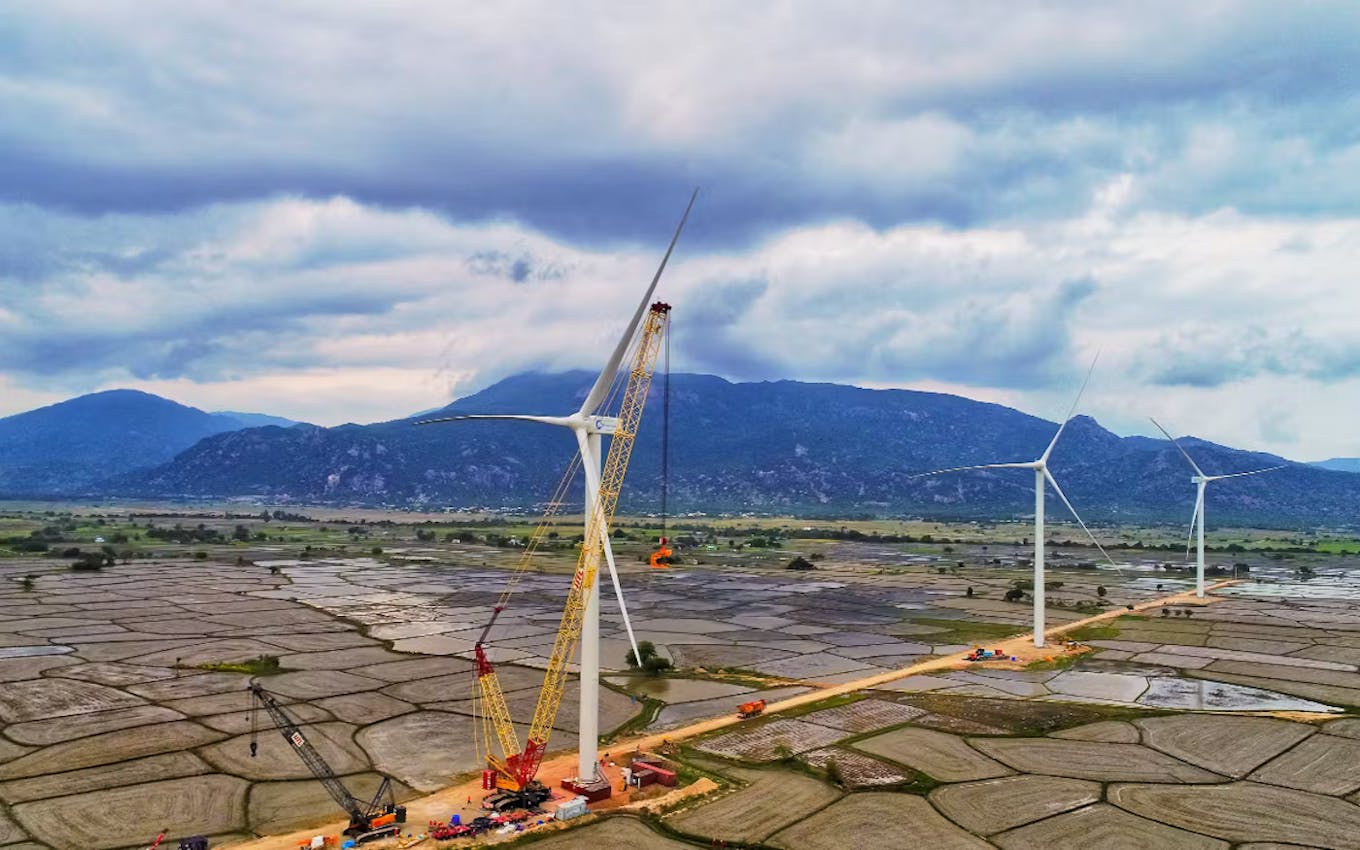
A wind turbine project by Singapore-based The Blue Circle in Southern Vietnam. Image: The Blue Circle.
Vietnam – despite being Southeast Asia’s renewables leader with 70 per cent of the region’s installed solar and wind power capacity – faces uncertainty due to governance limbo and a clampdown on corruption. Vietnam’s “Power Development Plan 8” has been delayed by two years, causing a lack of clarity on renewable energy targets.
Internal investigations into pricing deals for previous renewable projects further stall progress. As other Southeast Asian nations advance their green transitions, analysts warn that Vietnam’s policy void may deter investors, impacting future developments and making the market challenging for new entrants.
8. Dimsum from microbes, anyone?: How alternative proteins are cheaper, tastier and going local

What are the latest trends in the alternative proteins industry today? The Eco-Business podcast discusses new hybrid products, more localised offerings and cheaper prices due to economies of scale. Image: Flickr/ RosieTulips
The alternative proteins industry is ripe with creative innovations that span from cell-based kangaroo meat to vegan filet mignon and even dairy from micro-organisms.
Despite a global economic slowdown and slowing sales, firms are investing hundreds of millions in research and development. In this podcast, Eco-Business interviews industry insiders, Mindy Leveille and Jennifer Morton from nutrition and taste firm Kerry and Good Food Institute APAC respectively, to explore upcoming trends, challenges and opportunities in the alternative protein food sector.
The podcast is part of the ‘Future of Food’ series commissioned by Kerry which won the top prize at the WAN-IFRA Asian Digital Media Awards this year.
9. Singapore watchdog bans aircon ad claiming it can ‘save the Earth’ after greenwash complaint, in first ruling of its kind in Asia

An advertising campaign for Prism+ airconditioners featuring Singaporean influencer Xiaxue. The campaign has been removed after Singapore’s ad watchdog ruled that it misled consumers. Images: Prism+
In a landmark decision, an advertisement for Prism+ Zero Smart Aircon units in Singapore claiming consumers can “save Earth” by buying its energy-efficient airconditioners has been called out by the Advertising Standards Authority of Singapore for outright greenwashing.
The video ad features an influencer setting her air conditioner to 23°C to “save Earth and electricity” – a seemingly ridiculous claim as airconditioners account for nearly a quarter of the energy consumption of a typical household in Singapore.
The ruling marks the first time that an advertising campaign in Singapore, or anywhere in Asia, has been banned for greenwashing.
10. Individual action makes little difference to the climate crisis – we need to go after Big Oil, says author

“We should fly without guilt, not because flying is not harmful, but because the responsibility to fix it [the climate impact of aviation] is not ours,” said Assaad Razzouk, author of new climate book Saving the Planet Without the Bullshit. Image: jANgsg/Flickr
Individual actions like going vegan or flying less have minimal impact on climate change, says Assaad Razzouk, author of Saving the Planet Without the Bullshit. Razzouk argues that governments must take systemic actions, such as ending fossil fuel subsidies, to address the climate crisis effectively. He contends that blaming individuals for their carbon footprints deflects responsibility from fossil fuel firms, highlighting the need for a clearer focus on major climate culprits.
It is well-documented that even the concept of ‘carbon footprint’ was popularised by Ogilvy and fossil fuel company BP to shift the emissions burden onto the consumer. As Razzouk colourfully puts it: “We are scraping together mere pennies reducing, reusing and recycling, while oil companies burn hundred-dollar bills”.
Did you enjoy these stories? Let us know what we should be writing about in 2024 by sending your comments to news@eco-business.com. This story is part of our Year in Review series.

